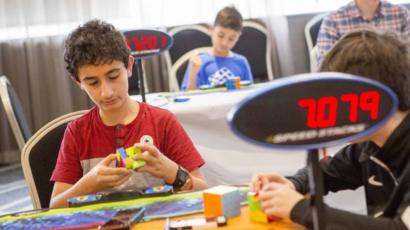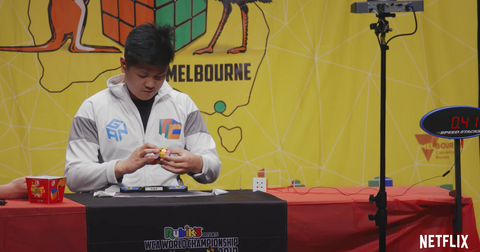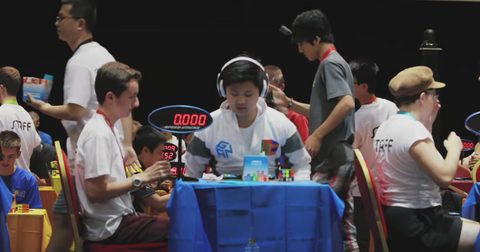
If you happen to be reading this, do yourself a favor: Stop reading this.
Instead, go to Netflix and cue up The Speed Cubers, the streaming service’s new documentary. Don’t read plot synopses, recaps, analyses or first reactions. It’s only 40 minutes long, so carve out the same attentive time you would for your favorite TV show. Then come back here. We can wait.
Did you see it? Liar. Seriously, go see it first.
The reason we’re being so pushy is because Cubers is one of those rare movies that to review it is to lessen it. Reviews require the very synopses and analyses that will to ruin the wondrous surprise the film holds for us. Cubers is not about what it appears, making it one of 2020’s best cinematic revelations.
Cubers begins wordlessly inside the 2017 World Rubik’s Cube Championships in Melbourne. A title sequence informs us that it takes the average person three hours to finish their first Rubik’s Cube.
Cubers do it in 7 seconds.
Or, if you’re Max Park and Feliks Zemdegs, less. They are at the center of Cubers, but the film is about so much more than their prodigious talents. More than their unlikely friendship. Instead, Cubers is ultimately about paying attention and raising kids right. By Hollywood standards, that’s about as rare as a silent film.
The movie briefly addresses the prowess of speedcubers. While most puzzle players memorize a handful of algorithms to solve the square, professional cubers memorize more than 300. Add to that the dexterity of card magicians, and speedcubers see a 7-second solve the way runners view a 4-minute mile: the gold standard.
But director Sue Kim deftly moves from puzzle to portrait, specifically an artful capture of the Park family: father Schwan, mother Miki and 17-year-old Max, who was born with autism. The parents poignantly recall the difficulties connecting with their son and the joy in finding a tool for Max to focus, socialize, excel.
The scenes here, of parents grappling with a child “on the spectrum,” make the film. Schwan has the eloquence of a poet, and Miki’s determination to get through to her son is a near-ballet of mirroring, comforting and occasionally consoling. Normally, parents get short shrift in Hollywood. They’re oblivious (American Pie), absent (Home Alone) or overbearing (Meet the Parents).
Here they’re perfect — on both ends of the spectrum. At the other end sits Zemdegs, an equally astonishing 23-year-old. Feliks is one of the founding fathers of speedcubing, one of the first to measure problem-solving in seconds instead of minutes.
He’s as remarkable as Max. Despite wunderkind talent, Feliks — empowered by mother Rita, who took a Zen-like approach to her son’s obsessive cube fetish — seems profoundly at ease with his diminishing skills. He holds a full-time job, moves within a circle of friends and, most importantly, is proud to be a role model for Max and other cubers who worship his career. Every great athlete in any sport could take a cue from him.
Speaking of sport, Cubers has a competition build-up that’s as dramatic as any sports showdown. This is Rocky meets Chasing Bobby Fischer.
We won’t give anything away in terms of the championships, but the contests really don’t matter in The Speed Cubers. What matters are the relationships that spring from the competition. And, like a solved Rubik’s Cube, The Speed Cubers is a perfect little diversion, on every side.
